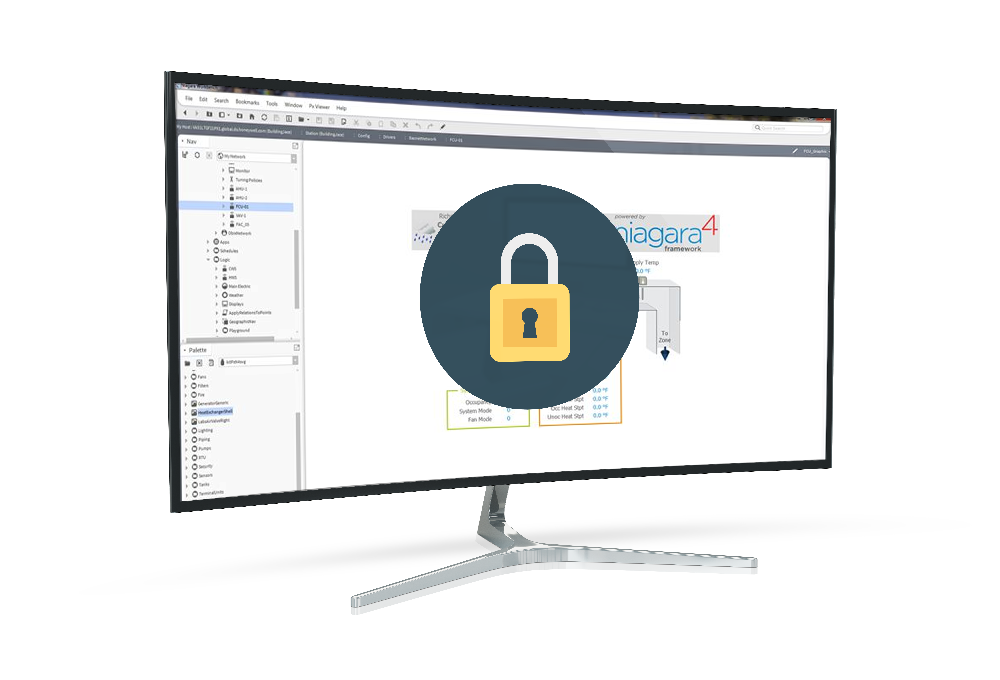Understand Security with Niagara 4 Training
Certificates/PKI, Encryption, Handshakes, Authentication, Passwords, VPN’s, Ports/Protocols…
Our 1 day, online MASTER CLASS will provide insight into these key security technologies and desmonstrate how they are used to implement modern-day security in a Niagara 4 environment.

Get up to speed
Niagara 4 from Tridium includes a whole host of modern-day security features & functionality that serve to deliver the most secure building integration platform on the market. To correctly deploy these features however, a building engineer must first understand what those technologies are, and how they work. They must also be familiar with several security best practices in order to make the most of these advanced security features.
Delivered by Tom Stephens, our very own Network & IT Specialist, this 1 day ‘Masterclass’ will provide an insight into the key security features of Niagara 4 that a 21st Century Smart Building Engineer should be familiar with.
Key security insights
IT & Information Security is a key topic, especially in the modern, connected world we live in. Computers & Networks don’t just serve as an aid to our work & social lives, they are very much part of the fabric of modern civilization itself. We are in the age were convenience is king, technology allows us to do things that in very recent history would have been nothing but a dream.
Smart & Connected buildings bring a new challenge to the building controls & systems integration marketplace. We are connecting more systems together than ever, we are using new and highly capable technology, we are interfacing to systems outside of the closed building environment, the cloud, and providing more convenient ways for people to access their building data.
All of this is a fantastic demonstration of technology, it is pushing our industry forward and enabling building owners, managers and occupants to get more from the smart building experience. However it also creates something else, something that must be understood, and must be addressed:
This might ring alarm bells, and it should. However, these risks come naturally with most areas of technology and so long as careful planning & consideration is taken when designing your building system, all of the above risks can be lowered, and you can ensure that your system adheres to a set of solid information security principals.
Niagara 4 from Tridium includes a whole host of modern-day security features & functionality that serve to deliver the most secure building integration platform on the market. To correctly deploy these features however, a building engineer must first understand what those technologies are, and how they work. They must also be familiar with several security best practices in order to make the most of these advanced security features.
Delivered by Tom Stephens, our very own Network & IT Specialist, this 1 day ‘Masterclass’ will provide an insight into the following key areas of Security in Tridium’s Niagara 4:
- Understanding the ‘attack surface’, ways in which a Niagara 4 system may be exposed to attack. In order to mitigate risks, you first need to identify them! This includes how to identify & probe vulnerable systems/devices/protocols.
- What protocols are in use? What unnecessary services are running? Do they implement good security practice? Can they be disabled; can we compromise them to gain access to a system? Why you need to use FOXS, PLATS, HTTPS etc…
- SSL/TLS and the role Certificates play in providing Encrypted & Authenticated connections. How to correctly implement Certificates & PKI (Public Key Infrastructure) in Niagara 4? Managing certificates, using Private & Public Certificate Authorities. Understanding the TLS (Transport Layer Security) handshake. How do hostnames & DNS tie into all of this, required infrastructure?
- Designing and maintaining a good ‘password practice’. Randomly generating passwords, minimum requirements, securely storing and distributing credentials.
- Niagara 4 station sensitive data encryption. How does the station store passwords etc? System passphrase & its importance.
- Brief insight into common Encryption mechanisms and Ciphers. AES, RSA etc…
- Understanding the need for remote access. How can this be done, methods for securing it? Firewalls, VPN, 2 Factor Authentication, coupling with TLS etc…
- Acknowledging that security is only as strong as the weakest link, which is usually us. How do we teach good security practice, what technology can we use to try and force good habits?
This one day online, remote course will follow a workshop/presentation format. Students will be invited into a video/screen share conference call with the teacher, and also be given access to a dedicated training network & remote desktop session where they will work through examples and actually get to experience and implement what is being covered. The session will be very interactive, any questions or specifics we will try to address whilst making sure all items on the agenda above are covered.
What are you waiting for? Up your IT security game now and demonstrate to your clients that you understand how to bring that risk level down and deliver a secure Niagara 4 system!





